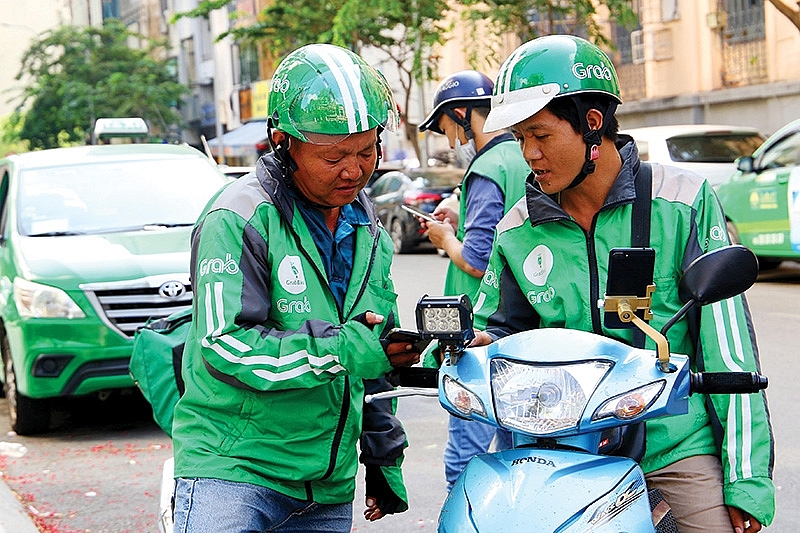Taxi firms risk misleading consumers
 |
| Grab believed that unfair practices by taxi firms will set a precedent of unneccessary legal complexities, Photo: Le Toan |
Several traditional taxi companies have made known their belief that Grab is disingenuous about the true nature of its operations in Vietnam. However Ngo Thanh Tung, managing partner of Vietnam International Law Firm (VILAF), said that Grab is not a transportation service. “Grab does not own cars, only an IT platform in which drivers can register,” said Tung. “It provides a solution for freelance drivers to earn a legitimate income. There are no provisions prohibiting Grab to provide these services.”
In reality, Grab’s operations in Vietnam have always been compliant with current rules and regulations. GrabCar was granted an e-hailing license under the Ministry of Transport’s Decision No.24/QD-BGTVT issued in January 2016 on pilot application of science and technology in passenger transportation by contracts to pilot the application of science and technology in managing and connecting contract-based passenger transportation. Meanwhile, GrabTaxi was registered with the Ministry of Industry and Trade as an e-commerce platform, which was accepted nationwide and complies with Decree No.52/2013/ND-CP regarding e-commerce.
The government has recently extended the pilot programmes for e-hailing businesses until the new decree replacing the existing Decree No.86/2014/ND-CP on business and conditions for transportation business by auto comes into effect. Thus, it is groundless for traditional firms to accuse Grab of violating regulations under Decision 24.
Accusations by traditional firms can adversely affect Grab’s investment in the country. Truong Thanh Duc, the chairman of Vietnamese law firm Basico, said, “Grab can sue taxi groups for carrying out anti-competitive practices which result in damages on its reputation, assets, or earnings. This includes affixing banners on their cabs to protest against ride-hailing firms.”
Duc continued, “Incorrect information can be corrected, but it is hard to fix damaged reputations and revenues. Those who deliberately take advantage of misleading information in the law to accuse other businesses are committing violations themselves.”
Nguyen Tri Hieu, a Vietnamese financial expert, said that anti-competitive practices would adversely impact the local investment climate as well as pose high risks for foreign companies investing in Vietnam.
“With the Comprehensive and Progressive Agreement for Trans-Pacific Partnership (CPTPP) already in effect, these practices would create a barrier for international companies to pour money into technology fields here, as well as for other foreign companies to commit long-term investment in the country,” said Hieu.
Indeed, several unfair practices have been taking place in the fierce battle between traditional firms and disruptive businesses, which is against international competition law. Some traditional groups make baseless allegations in an attempt to ruin the reputation of ride-hailing firms. With Vietnam as a member of the CPTPP, any lawsuit between local and foreign firms will be filed to a higher international court, in turn making Vietnam less attractive in the eyes of outside investors.
Tung from VILAF cited the lawsuit between Grab and Vinasun as an unprecedented case reflecting the mindset of a judicial system towards new business trends, a legal fight between the new and the old, and between short-sighted protectionism and competition The unfair practice will set a bad precedent for other traditional companies and inadvertently encourage them to take the easy way out and maintain the status quo by suing competitors instead of constantly innovating through technology to remain relevant and competitive.
“It clearly sends a negative message, internationally and domestically, to technology companies and entrepreneurs that want to invest, innovate, grow, and unleash the potential of Vietnam’s thriving and vibrant tech ecosystem,” an industry insider said.
What the stars mean:
★ Poor ★ ★ Promising ★★★ Good ★★★★ Very good ★★★★★ Exceptional
Related Contents
Latest News
More News
- Masan Consumer names new deputy CEO to drive foods and beverages growth (February 23, 2026 | 20:52)
- Myriad risks ahead, but ones Vietnam can confront (February 20, 2026 | 15:02)
- Vietnam making the leap into AI and semiconductors (February 20, 2026 | 09:37)
- Funding must be activated for semiconductor success (February 20, 2026 | 09:20)
- Resilience as new benchmark for smarter infrastructure (February 19, 2026 | 20:35)
- A golden time to shine within ASEAN (February 19, 2026 | 20:22)
- Vietnam’s pivotal year for advancing sustainability (February 19, 2026 | 08:44)
- Strengthening the core role of industry and trade (February 19, 2026 | 08:35)
- Future orientations for healthcare improvements (February 19, 2026 | 08:29)
- Infrastructure orientations suitable for a new chapter (February 19, 2026 | 08:15)

 Tag:
Tag:



















 Mobile Version
Mobile Version